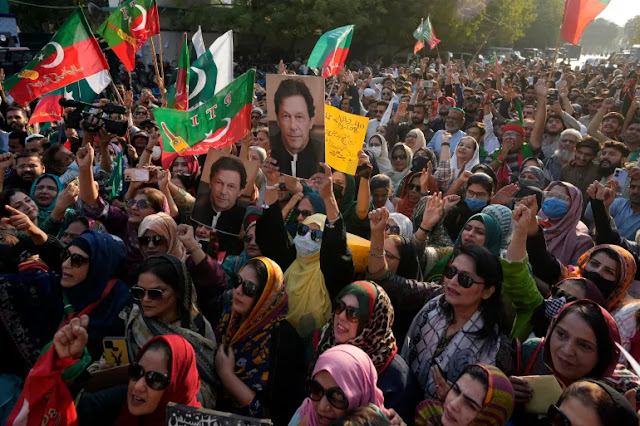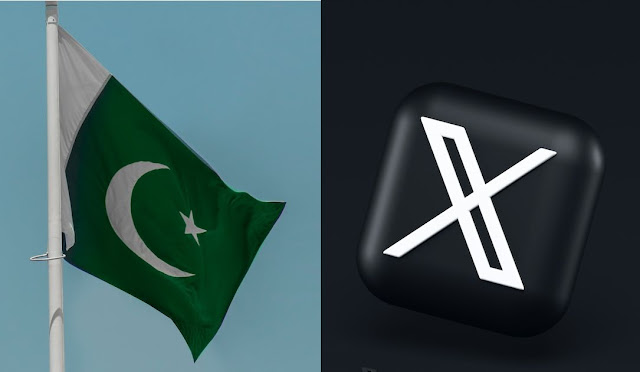Pakistan election: Can Imran Khan’s winning candidates form a government?
Pakistan is in political limbo after a split verdict. But what options does Khan’s PTI have, after candidates won the most seats?
Islamabad, Pakistan — Five days after the elections on February 8, Pakistan is nowhere closer to knowing which parties are going to make its next government and who might be its next prime minister.
The elections delivered a split mandate amid a cloud of
questions over the fairness of the climate in which they were held, allegations
of serious manipulation, and challenges to the accuracy of the vote counts that
dragged on for three days.
Leading with 93 seats are the candidates affiliated with the
Pakistan Tehreek-e-Insaf (PTI) of former Prime Minister Imran Khan, who were
forced to contest the election as independents, without their electoral symbol,
the cricket bat.
They are followed by the Pakistan Muslim League-Nawaz (PMLN) of three-time ex-Prime Minister Nawaz Sharif, which has won 75 seats and in theory, is the single-largest party in the National Assembly, even though the figure amounts to less than a third of the 266 seats that were up for grabs on February 8.
In third place is the Pakistan People’s Party (PPP) led by former Foreign Minister Bilawal Bhutto Zardari, which has secured 54 seats.
But can the PTI-backed independents form or join a
government, what are the options for the party, and what comes next for the
country?
While technically, the PTI-backed independents could form
the core of a government in alliance with other parties, whose support they
would need to get to the 134-seat mark, such a path presents several
challenges.
Firstly, maintaining stability would be difficult. Such a
government would depend on the individual whims of independent
parliamentarians, making it susceptible to defections and potential collapse.
Secondly, as a collection of independents, the PTI bloc
would have to forfeit access to a chunk of the 70 seats reserved for women and
minorities, which are shared proportionately among parties represented in the
National Assembly.
But if PTI-backed independents were to join another party,
they would come under the discipline of that parent party, potentially
compromising their ability to act according to the policies and plans of the
PTI.
How soon must a government be formed
after polls?
Basil Nabi Malik, a Karachi-based lawyer, said that
according to the constitution, a new National Assembly session must be summoned
within three weeks of the elections.
“The law clearly states that the National Assembly shall
meet on the 21st day following the day on which the election to the assembly is
held, unless sooner summoned by the president,” he told Al Jazeera.
Unless Arif Alvi, the president, calls the session sooner, 21
days get over on February 29.
On the day of the session, if the parties have finalised
their allies and agreed on a coalition, the members of the house will be asked
to vote for the prime minister, speaker and deputy speaker.
A leader of the opposition will also be selected from one of
the parties which have decided against sitting on the treasury benches.
Which parties have made a move?
PMLN supreme Nawaz Sharif said in a speech on Friday from
the party headquarters in Lahore that he had instructed his brother Shehbaz
Sharif, also a former prime minister, to reach out to other political parties
which have won several seats in the election, to build a governing alliance.
The PMLN leadership has already met with counterparts from
the PPP, as well as representatives of the Muttahida Qaumi Movement (MQM),
which won 17 seats in Sindh province.
Still, the parties have not declared whether they plan to go
ahead with an alliance — and what the contours of any coalition might look
like.
What about the PTI? Will its
independents join another party?
The PTI, meanwhile, has focused on protesting alleged
manipulations in the election results.
The party leadership insists that the actual results of a
large number of their seats were overturned, depriving their candidates of
victory, and thus ensuring their seats remain under the magical figure of 134 seats.
Sayed Zulfikar Bukhari, a senior PTI member, has
categorically said that they will not join hands with any of the major
political parties.
“Our internal party discussions and consultations are
ongoing, and we have many options on the table,” he told Al Jazeera. “A
decision to join a party will be made very soon, but it will not be one of the
three or four major parties.”
A total of 13 parties have won at least one seat in the
National Assembly elections, of which six have secured a single seat.
If PTI-backed candidates do decide to join any other party,
they must announce their decision within three days of the official result
notification by the Election Commission of Pakistan (ECP). The ECP has yet to
announce the official result.
Is making another party an option for
PTI-backed independents?
Kanwar M Dilshad, a former secretary of the ECP and an
analyst, said that in theory, the PTI-backed independents could form a new
party — though the process of registration could take a few days.
But that won’t help the PTI in government formation right
now, since any new party would not have been part of the current election
process.
Malik, who is also an advocate at the Supreme Court, agreed
with Dilshad’s assessment: PTI-supported independent candidates can form a new
political party, but that won’t affect the formation of the incoming
government.



Comments
Post a Comment